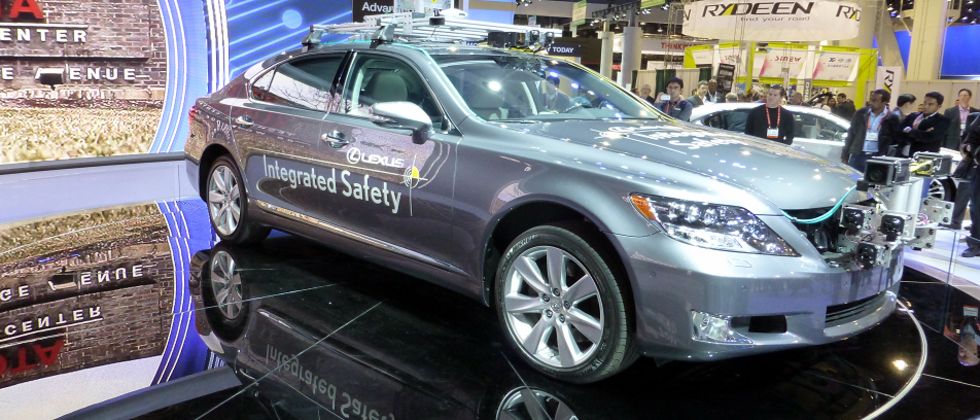California Management Review
California Management Review is a premier academic management journal published at UC Berkeley
by Michael Eliot

The annual Consumer Electronics Show took place on January 5th to 8th, 2017 in Las Vegas and brought together an estimated 150,000+ attendees to explore the latest in high-tech. Consisting of over 2.6 million square feet of exhibit space, the Las Vegas Convention Center (LVCC) and surrounding Vegas hotels were packed with business and tech-versed crowds trying to sneak a peek at the 3,800 vendor booths and displays of new electronics related products.
The biggest buzz this year involved the emergence of self-driving cars. Also referred to as autonomous vehicles, a self-driving car is intended to take over control of a car and allow the human driver to become a passenger. Tesla is already famously known for its Autopilot capability, which provides features for the car to do some of the driving, though the human driver must remain alert and ready to take back control of the vehicle when needed.
There is a business oriented arms race taking place among car companies, tech companies, and ride-sharing companies to see who can get to a true self-driving car first. The stakes are high. At CES, the CEO and chairman of Nissan Motor Corporation indicated in his keynote speech that the future of the auto industry relies on what he referred to as “intelligent mobility”. He asserted that self-driving cars will take over about one-quarter of the auto market by the year 2030 and that consumers will clamor to get such a car. Auto makers that don’t develop a self-driving car or that are delayed in releasing one will lose a sizable chunk of their market share.
The CEO of Ford, Mark Fields, similarly emphasized the future of cars in his presentation and indicated that “we’re no longer just a car company, now we are an automobile and mobility company.” One of the first to now adopt the Amazon Alexa voice processing system into their latest models, Fields predicted that autonomous vehicles will begin to appear in the market by the year 2021. It will take several years for the self-driving cars to gradually be adopted by consumers, and no one really knows whether consumers will be willing to trust these so-called smart cars. There is additional uncertainty over whether the price tag will keep such cars only available to those that can afford higher end vehicles that will be the first models to get the most complete self-driving features.
“We’re no longer just a car company, now we are an automobile and mobility company”
In addition to cars being able to self-drive, there is a big push toward making cars become fully connected. You will be able to readily connect your smartphone to your car, and your car will also be able to connect with other cars. This V2V or Vehicle-to-Vehicle capability will allow for cars to negotiate directly with each other and aid traffic flow. Imagine cars actively working together to smooth the flow of traffic and avoid freeway congestion that is normally caused by human drivers that try to wildly weave in and out of traffic. Cities and governmental agencies are also increasing the tech of the roadway infrastructure to allow for V2I or Vehicle-to-Infrastructure connectivity, allowing your car to find out the traffic lights status when they are going to change ahead from green to red and further optimizing traffic flow.
The Ford CEO indicated that he is doubling their staff of software technicians to keep pace with the anticipated 30 percent year-to-year growth of the mobile car market. He predicted the market to reach about $130 billion in size by the year 2019. The CES show had a plethora of auto makers such as BMW, Mercedes Benz, Ford, Nissan, Audi, Toyota, and others that were showcasing their newest mobility features for a car, and showed off their concept cars depicting the future of self-driving vehicles. Some of the auto makers allowed attendees to even take a ride around Las Vegas to experience a self-driving car in action. Notably, these experimental cars had a trained technician to take over the driving if the Artificial Intelligence (AI) malfunctioned.
Ride-sharing services such as Uber and Lyft are aware that the advent of self-driving cars could significantly impact their business model. If consumers buy self-driving cars, there potential decreasing demand for an Uber or Lyft, since the consumer can merely summon their own self-driving car via their smartphone to come pick them up and provide a lift to wherever they need to go. Consumers themselves might essentially become mini-Uber’s by allowing their own car to provide rides to those needing a lift and charge a fee to do so. The ride-sharing companies are betting that by being the first to get to self-driving cars, they, instead of consumers, will continue to provide ride-sharing services and will do so at a lower cost by eliminating the labor that they employ today.
Numerous predictions about the coming transformation of automobiles and the auto-industry were voiced at CES, and yet no one really is certain how exactly the market will develop. Will fully self-driving cars be available in the next 2 years, or 5 years, or 10 years? Will consumers embrace the self-driving car? What kinds of mobility features will be in high demand? These questions are yet to be answered. One thing that seems sure, as the Ford CEO stated aptly, “we’ll see more change in the next 10 years than we have in the last 50”. Being in Vegas for the CES event, I avoided gambling in casinos, but I am willing to bet on the emergence of self-driving cars and a massive disruption to the way in which we drive and how business and society is shaped around the automobile.